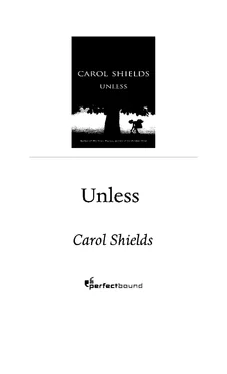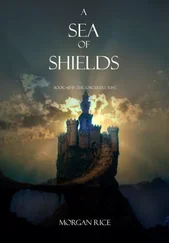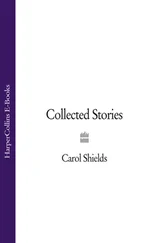Carol Shields - Unless
Здесь есть возможность читать онлайн «Carol Shields - Unless» — ознакомительный отрывок электронной книги совершенно бесплатно, а после прочтения отрывка купить полную версию. В некоторых случаях можно слушать аудио, скачать через торрент в формате fb2 и присутствует краткое содержание. Жанр: Современная проза, на английском языке. Описание произведения, (предисловие) а так же отзывы посетителей доступны на портале библиотеки ЛибКат.
- Название:Unless
- Автор:
- Жанр:
- Год:неизвестен
- ISBN:нет данных
- Рейтинг книги:4 / 5. Голосов: 1
-
Избранное:Добавить в избранное
- Отзывы:
-
Ваша оценка:
- 80
- 1
- 2
- 3
- 4
- 5
Unless: краткое содержание, описание и аннотация
Предлагаем к чтению аннотацию, описание, краткое содержание или предисловие (зависит от того, что написал сам автор книги «Unless»). Если вы не нашли необходимую информацию о книге — напишите в комментариях, мы постараемся отыскать её.
Unless — читать онлайн ознакомительный отрывок
Ниже представлен текст книги, разбитый по страницам. Система сохранения места последней прочитанной страницы, позволяет с удобством читать онлайн бесплатно книгу «Unless», без необходимости каждый раз заново искать на чём Вы остановились. Поставьте закладку, и сможете в любой момент перейти на страницу, на которой закончили чтение.
Интервал:
Закладка:
I let it go. A writer’s partis pris are always — must be — accommodated by her translator.
I know that much after all these years.
There are other things I could do with my time besides clean my house. There’s that book on animals in Shakespeare, the companion volume to my Shakespeare and Flowers. Or I could finish my translation of the fourth and final volume of Westerman’s memoirs, which would take me about six months. Instead I’m writing a second novel, which is going slowly because I wake up in the morning anxious, instead, to clean my house. I’d like to go at it with Q-tips, with toothpicks, every crack and corner scoured. Mention a new cleaning product and I yearn to hold it in my hand; I can’t stop. Each day I open my eyes and comfort myself with the tasks that I will accomplish. It’s necessary, I’m finding, to learn devious means of consoling oneself and also necessary to forgive one’s own eccentricities. In the afternoon, after a standing-up lunch of cheese and crackers, I get to my novel and produce, on a good day, two pages, sometimes three or four. I perch on my Freedom Chair and think: Here I am.
A woman seated. A woman thinking. But I’m always rushed, always distracted. Tuesdays I meet my friends for coffee in Orangetown, Wednesdays I go to Toronto, every second Thursday afternoon is the Library Board meeting.
Last Friday, after days spent at home waiting for a phone call from Mrs. Quinn at the Promise Hostel — which yielded nothing but the fact that nothing had changed — I went into Toronto with Tom to a one-day trilobite conference at the museum, and even attended a session, thinking it might provide distraction. A paleontologist, a woman called Margaret Henriksen, from Minneapolis, lectured in a darkened room, and illustrated her talk with a digital representation of a trilobite folding itself into a little ball. No one has ever seen a trilobite, since they exist only in the fossil record, but the sections of its bony thorax recorded in stone were so perfectly made that, when threatened, these creatures were able to curl up, each segment nesting into the next and protecting the soft animal underbodies. This act is called enrolment, a rather common behaviour for arthropods, and it seems to me that this is what Tom has been doing these past weeks. I clean my house and he “enrols” into a silence that carries him further away from me than the fleeting figure of Mrs. McGinn, who rests like a dust mote in the corner of my eye, wondering why she was not invited to her friend’s baby shower on that March evening back in 1961. It nags at her. She is disappointed in herself. Her life has been burning up one day at a time — she understands this for the first time — and she’s swallowed the flames without blinking. Now, suddenly, this emptiness. Nothing has prepared her for the wide, grey simplicity of sadness and for the knowledge that this is what the rest of her life will be like, living in a falling-apart house that wishes she weren’t there.
After the conference in Toronto, some trilobite friends from England wanted to go for a meal at a place called the Frontier Bar on Bloor Street West, where the theme is Wild West.
They’d read about it in a tour guide and thought it might be amusing.
Everything’s in your face at the Frontier Bar — from the cowhides nailed to the walls to the swizzle sticks topped with little plastic cowboy hats. The drinks have names like Rodeo Rumba and Crazy Heehaw, and we felt just a little effete ordering our bottle of good white wine. Before we said goodnight at the end of the evening, I excused myself to go to the women’s washroom (the Cowgals’ Corral), and there I found, on the back of each cubicle door, a tiny blackboard supplied with chalk, a ploy by the management to avoid the defacing of property.
’ve often talked to Tom about the graffiti found in public bathrooms; we’ve compared notes. The words women write on walls are so touchingly sweet, so innocent. Tom can hardly believe it. “Tomorrow is cancelled,” I saw once. And another time, “Saskatchewan Libre!”
Once, a little poem. “If you sprinkle / when you tinkle / Please be a sweetie / and wipe the seatie.” I love especially the slightly off witticisms, the thoughts that seemed unable to complete themselves except in their whittled-down elliptical, impermanent forms.
I’d never before felt an urge to add to the literature of washroom walls, but that night, at the Frontier Bar, I picked up the piece of chalk without a moment’s hesitation, my head a ringing vessel of pain, and my words ready.
First, though, I wiped the little slate clean with a dampened paper towel, obliterating “Hi, Mom” and “Lori farts” and leaving myself a clear space. “My heart is broken,” I wrote in block letters, moved by an impulse I would later recognize as dramatic, childish, indulgent, grandiose and powerful. Then, a whimsical afterthought: I drew a little heart in the corner and put a jagged line through it, acutely aware of the facile quality of the drafts-manship.
At once I felt a release of pressure around my ribs. Something not unlike jubilation rubbed against me, just for a moment, half a moment, as though under some enchantment I was allowed to be receptor and transmitter both, not a dead thing but a live link in the storage of what would become an unendurable grief. I believed at that instant in my own gusto, that I’d set down words of revealing truth, inscribing the most private and alarming of visions instead of the whining melodramatic scrawl it really was, and that this unscrolling of sorrow in a toilet cubicle had all along been my most deeply held ambition.
I went to join the others gathered on the pavement outside the bar. They hadn’t noticed I’d been away so long, and perhaps it really had been only a moment or two. Everyone was topped up with good wine and bad food and they were chattering about Toronto and how strange that such campy curiosities as the Frontier Bar continued to exist. Tom slid an arm around my waist, oh so sweetly that I half believed I’d left my poison behind. The night air was bitingly cold, close to freezing, but for the first time in weeks I was able to take a deep breath. My Heart Is Broken. My mouth closed on the words, and then I swallowed.
So
“So-oo-oo?” my daughter Norah once asked me — she was about nine years old. “Why exactly is it that you and Daddy aren’t married?”
I had been waiting for the question for some years, and was prepared. “We really are married,” I told her. “In the real sense of the word, we are married.” She and I were in Orangetown on a Saturday morning, in the only shoe store in town not counting the ones out at the mall, and Norah was trying on new school shoes. “We’re married in that we’re together forever.”
“But,” she said, “you didn’t have a wedding.”
“We had a reception,” I told her cheerily. This diversion from wedding to reception had always been part of my plan. “We had a dinner for friends and family at your father’s apartment.”
“What kind of reception?”
How easily I managed to lead her sideways. “We had pizza and beer,” I said. “And champagne for toasts.”
“Was Grandma Winters there?”
“Well, no. She and Grandpa Winters had another reception for us later. Sort of a tea party.”
“What did you wear?”
“You mean at the pizza party?”
“Yes.”
“I had a caftan that Emma Allen made out of some African cotton. A blue and black block print. You’ve seen the picture. Only she was Emma McIntosh then.”
“Was she your bridesmaid?”
“Sort of. We didn’t use that word in those days.”
“Why not?”
“This was back in the seventies. Weddings were out of style back then. People didn’t think they were important, not if two people really loved each other.”
Читать дальшеИнтервал:
Закладка:
Похожие книги на «Unless»
Представляем Вашему вниманию похожие книги на «Unless» списком для выбора. Мы отобрали схожую по названию и смыслу литературу в надежде предоставить читателям больше вариантов отыскать новые, интересные, ещё непрочитанные произведения.
Обсуждение, отзывы о книге «Unless» и просто собственные мнения читателей. Оставьте ваши комментарии, напишите, что Вы думаете о произведении, его смысле или главных героях. Укажите что конкретно понравилось, а что нет, и почему Вы так считаете.












